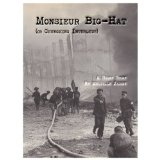Monsieur Big-Hat – Melville Jacoby in Chungking 1940
Posted: November 28th, 2012 | No Comments »I blogged briefly this summer about a new biography by Bill Lascher of the great American journalist in China Melville Jacoby. Jacoby certainly deserves a full biography though I mentioned him briefly in my history of foreign journalists in China (Through the Looking Glass). While preparing the full bio Lascher has now uploaded a a short story Jacoby wrote depicting what happened when an American correspondent and a French diplomat met during an air raid in Chungking in June, 1940. It’s a pretty vivid description of what the raids were like and it includes a couple great photos Jacoby took during one of them. It’s called Monsieur Big-Hat and all for just GBP1.28 on amazon.co.uk or also on amazon.com. Well worth the money…
It’s June, 1940, World War II is well underway, and bombs are falling on Chungking, the wartime capital of the Republic of China. In a crowded bunker carved beneath the city, an American correspondent watches while a French diplomat, clutching a ticket home after five years away, makes a fateful decision that underscores dark news arriving from Paris.
Unpublished for 72 years, this short story was originally written in 1940 by Melville Jacoby. Jacoby worked for many years as a foreign correspondent in China and endured hundreds of air raids while working in Chungking (now known as Chongqing). Later Time Magazine’s Far East bureau chief, Jacoby survived a harrowing escape from the Philippines during World War II, only to became the magazine’s first reporter to die on duty after a freak airfield accident in Australia in 1942 took his life when he was just 25 years old.
Primarily a journalist, Jacoby’s dabblings in fiction were never published. Clearly informed by Jacoby’s own experiences during the outset of the war, “Monsieur Big-Hat” presents the very real wartime anxiety felt by the Chinese and westerners in 1940.

Leave a Reply